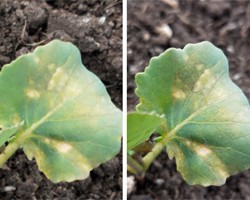How to Take a Photo for Crop Diagnostics
Elizabeth Buck, Extension Vegetable Specialist
Cornell Vegetable Program

Capturing diagnostically useful images is not as simple as snapping a picture of cute children or animals.
With the current push to work remotely, using pictures to quickly address production questions has a lot of appeal and utility. I love the idea of using grower-captured photos to hasten the trouble-shooting process, especially since it isn't always possible to make prompt farm visits. But in practice it can be quite tough to work out a problem using photos because of poor image quality. High quality diagnostic photos absolutely can allow us (and other ag professionals) to make pretty confident IDs and assessments of what is going wrong.
In How to Take a Photo for Crop Diagnostics, readers will learn:
- What makes a high quality image?
- Things you should know
- Different problems need different images
- Steps for taking a high quality image
- Pro tips
- ...plus there a several side-by-side comparisons of poor quality photos versus high quality images with tips on what changes the photographer made to take the better photo
How to Take a Photo for Crop Diagnostics (pdf; 676KB)

Upcoming Events
Vegetable Pest and Cultural Management Field Meeting for Auction Growers -- Ontario Produce Auction
July 15, 2025
Stanley, NY
This evening meeting will demonstrate pest management in fresh market vegetables in both field and greenhouse (high tunnel) vegetables, primarily for those growing for wholesale auction. A hands-on demonstration of weed, insect and disease identification in vegetables including management options. Details on each topic will focus on field observations at the farm.
Orleans Summer Vegetable Meeting, 2025
July 16, 2025
Waterport, NY
Meeting themes are pest management in a wide array of produce and best practices for pesticide use. Professor Brian Nault will cover allium leaf miner and thrips in onions, garlic, and leeks, and discuss insect challenges in other crops. Bring your questions! We'll also have a field walk that includes high tunnel tomato and cucumber.
DEC credits available: 0.5 in CORE plus either 1.25 in 1a and 23, or 0.75 in 24.
Vegetable Pest and Cultural Management Field Meeting for Auction Growers -- Finger Lakes Produce Auction
July 18, 2025
Penn Yan, NY
This evening meeting will demonstrate pest management in fresh market vegetables in both field and greenhouse (high tunnel) vegetables, primarily for those growing for wholesale auction. A hands-on demonstration of weed, insect and disease identification in vegetables including management options. Details on each topic will focus on field observations at the farm.


































